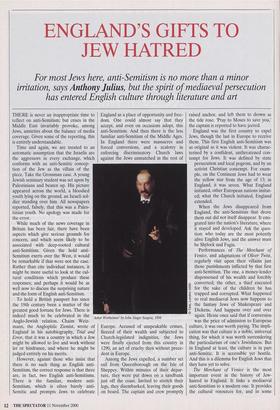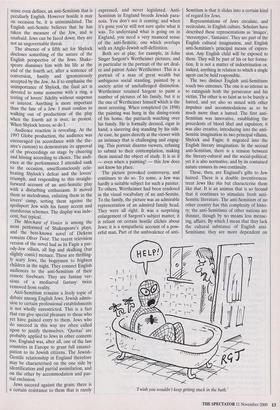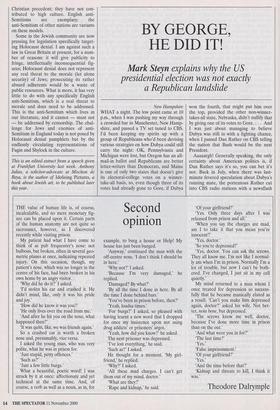ENGLAND'S GIFTS TO JEW HATRED
For most Jews here, anti-Semitism is no more than a minor
irritation, says Anthony Julius, but the spirit of mediaeval persecution
has entered English culture through literature and art
THERE is never an inappropriate time to reflect on anti-Semitism; but crises in the Middle East invariably provoke, among Jews, anxieties about the balance of media coverage. Given some of the reporting, this is entirely understandable.
Time and again, we are treated to an automatic assumption that the Israelis are the aggressors in every exchange, which conforms with an anti-Semitic concep- tion of the Jew as the villain of the piece. Take the Grossman case. A young Jewish seminary student was set upon by Palestinians and beaten up. His picture appeared across the world, a bloodied youth lying on the ground, an Israeli sol- dier standing over him. All newspapers reported, falsely, that this was a Pales- tinian youth. No apology was made for the error.
While much of the news coverage in Britain has been fair, there have been aspects which give serious grounds for concern, and which seem likely to be associated with deep-rooted cultural anti-Semitism. Given the hold anti- Semitism exerts over the West, it would be remarkable if that were not the case. Rather than cite individual instances, it might be more useful to look at the cul- tural conditions which produce these responses; and perhaps it would be as well now to discuss the surprising nature and the form of English anti-Semitism.
To hold a British passport has since the 19th century been a matter of the greatest good fortune for Jews. There is indeed much to be celebrated in the Anglo-Jewish relation. Chaim Weiz- mann, the Anglophile Zionist, wrote of England in his autobiography, Trial and Error, that it was a country in which a Jew might be allowed to live and work without let or hindrance, and where he might be judged entirely on his merits.
However, against those who insist that there is no such thing as English anti- Semitism, the correct response is that there are, in fact, two English anti-Sernitisms. There is the familiar, modern anti- Semitism, which is often barely anti- Semitic and prompts Jews to celebrate England as a place of opportunity and free- dom. One could almost say that they accept, and even on occasions adopt, this anti-Semitism. And then there is the less familiar anti-Semitism of the Middle Ages. In England there were massacres and forced conversions, and a zealotry in enforcing discriminatory Church laws against the Jews unmatched in the rest of
Asher Wertheimer' by John Singer Sargent, 1898
Europe. Accused of unspeakable crimes, fleeced of their wealth and subjected to Church-legislated indignities, the Jews were finally ejected from this country in 1290, an act of cruelty then without prece- dent in Europe.
Among the Jews expelled, a number set sail from Queenborough on the Isle of Sheppey. Within minutes of their depar- ture, they were put down on a sandbank just off the coast. Invited to stretch their legs, they disembarked, leaving their goods on board. The captain and crew promptly raised anchor, and left them to drown as the tide rose. 'Pray to Moses to save you,' the captain is reported to have jeered.
England was the first country to expel Jews, though the last in Europe to receive them. This first English anti-Semitism was as original as it was violent. It was charac- terised by a confident, unthreatened con- tempt for Jews. It was defined by state persecution and local pogrom, and by an activist Christian contempt. For exam- ple, on the Continent Jews had to wear the yellow star from the age of 13; in England, it was seven. What England initiated, other European nations imitat- ed; what the Church initiated, England extended.
When the Jews disappeared from England, the anti-Semitism that drove them out did not itself disappear. It emi- grated into the nation's literature, where it stayed and developed. Ask the ques- tion: who today are the most potently alive English Jews, and the answer must be Shylock and Fagin.
Performances of The Merchant of Venice, and adaptations of Oliver Twist, regularly visit upon their villains just those punishments inflicted by that first anti-Semitism. The one, a money-lender dispossessed of his wealth and forcibly converted; the other, a thief executed for the sake of the children he has trapped and corrupted. What happened to real mediaeval Jews now happens to the fantasy Jews of Shakespeare and Dickens. And happens over and over again. Heine once said that if conversion was the price of admission to European culture, it was one worth paying. The impli- cation was that culture is a noble, universal thing, for which it was worth surrendering the particularism of one's Jewishness. But in England at least, the culture is in part anti-Semitic. It is accessible yet hostile. And this is a dilemma for English Jews that they have yet to solve.
The Merchant of Venice is the most important event in the history of Jew- hatred in England. It links a mediaeval anti-Semitism to a modern one. It provides the cultural resources for, and in some sense even defines, an anti-Semitism that is peculiarly English. However hostile it may on occasion be, it is unintimidated. The English anti-Semite believes that he has taken the measure of the Jew, and is unafraid. Jews can be faced down; they are not an ungovernable threat. The absence of a fifth act for Shylock discloses something of the nature of the English perspective of the Jews. Shake- _ speare dismisses him with his life at the end of the fourth act, after a sentence of conversion, hastily and ignominiously accepted by the Jew. As if to emphasise the unimportance of Shylock, the final act is devoted to some nonsense with a ring, a testing of lovers' fidelity without suspense or interest. Anything is more important than the fate of a Jew. I must confess to walking out of productions of the play when the fourth act is over, in protest. When Shylock leaves, so do I. Audience reaction is revealing. At the 1997 Globe production, the audience was encouraged (in accordance with the the- atre's custom) to demonstrate its approval of the proceedings on stage by cheering and hissing according to choice. The audi- ence at the performance I attended sank to the occasion, unselfconsciously cele- brating Shylock's defeat and the lovers' triumph, and responding to this straight- forward account of an anti-Semitic play with a disturbing enthusiasm. It moved them as melodrama, enlisting them in the lovers' camp, setting them against the spoilsport Jew with his funny accent and murderous schemes. The display was inde- cent, but typical. The Merchant of Venice is among the most performed of Shakespeare's plays, and the best-known novel of Dickens remains Oliver Twist. The recent television version of the novel had as its Fagin a par- ody-Jew villain, all lisp and skulking (but slightly comic) menace. These are thrilling- ly scary Jews, the bogeymen to frighten children in the night. They connect English audiences to the anti-Semitism of their remote forebears. They are fantasy ver- sions of a mediaeval fantasy: twice removed from reality. Anti-Semitism remains a lively topic of debate among English Jews. Jewish admis- sion to certain professional establishments is not wholly unrestricted. This is a fact that can give special pleasure to those who yet have gained entry to them. Jews who do succeed in this way are often called upon to justify themselves. 'Quotas' are probably applied to Jews in other contexts too. England was, after all, one of the last countries in Europe to grant full emanci- pation to its Jewish citizens. The Jewish- Gentile relationship in England therefore may be characterised on the one side by identification and partial assimilation, and on the other by accommodation and par- tial exclusion.
Jews succeed against the grain; there is a certain resistance to them that is rarely expressed, and never legislated. Anti- Semitism in England breeds Jewish para- noia. You don't see it coming; and when it's gone you're still not sure quite what it was. To understand what is going on in England, you need a very nuanced sense of the anti-Semitic, one which overlaps with an Anglo-Jewish self-definition.
Both are at play, for example, in John Singer Sargent's Wertheimer pictures, and in particular in the portrait of the art deal- er and patron Asher Wertheimer. This is a portrait of a man of great wealth but ambiguous social standing, painted by a society artist of unchallenged distinction. Wertheimer retained Sargent to paint a number of pictures of his family, but it is the one of Wertheimer himself which is the most arresting. When completed (in 1898) the painting was hung in the dining-room of his home, the patriarch watching over his family. He is formally dressed, cigar in hand, a slavering dog standing by his side. At ease, he gazes directly at the viewer with an intimacy that is challenging and engag- ing. This portrait disarms viewers, refusing to submit to their contemplation, making them instead the object of study. It is as if — even when a painting! — this Jew does not know his place.
The picture provoked controversy, and continues to do so. To some, a Jew was hardly a suitable subject for such a painter. To others, Wertheimer had been rendered in the visual vocabulary of an anti-Semite. To the family, the picture was an admirable representation of an admired family head. They were all right. It was a surprising enlargement of Sargent's subject matter; it is reliant on certain hostile clichés about Jews; it is a sympathetic account of a pow- erful man. Part of the ambivalence of anti- Semitism is that it slides into a certain kind of regard for Jews.
Representations of Jews circulate, and recirculate, in English culture. Scholars have described these representations as 'images', `stereotypes', 'fantasies'. They are part of the English cultural imagination, and English anti-Semitism's principal means of expres- sion. Any English child will be exposed to them. They will be part of his or her forma- tion. It is not a matter of indoctrination or, indeed, anything in relation to which a single agent can be held responsible.
The two distinct English anti-Semitisms touch two extremes. The one is so intense as to extinguish both the persecutor and his victim. The other is so faint as to be barely a hatred, and yet also so mixed with other impulses and accommodations as to be much more than a hatred. The first anti- Semitism was innovative, establishing the precedents of blood libel and expulsion; it was also creative, introducing into the anti- Semitic imagination its two principal villains, Shylock and Fagin; it migrated into the English literary imagination. In the second anti-Semitism, there is a tension between the literary-cultural and the social-political; yet it is also normative, and by its contained nature ensures its own continuity.
These, then, are England's gifts to Jew hatred. There is a double inventiveness: treat Jews like this but characterise them like that. It is an animus that is so fecund that it continues to stimulate fresh anti- Semitic literature. The anti-Semitism of no other country has this complexity of histo- ry; the anti-Semitisms of other nations are thinner, though by no means less menac- ing, affairs. By which I mean that they lack the cultural substance of English anti- Semitisms; they are more dependent on I wish you wouldn't keep getting stuck in the bath.' Christian precedent; they have not con- tributed to high culture. English anti- Semitisms are exemplary; the anti-Semitism of other nations are variants on these models.
Some in the Jewish community are now pressing for legislation specifically target- ing Holocaust denial. I am against such a law in Great Britain at present, for a num- ber of reasons: it will give publicity to fringe, intellectually inconsequential fig- ures; Holocaust denial does not represent any real threat to the morale (let alone security) of Jews; prosecuting its rather absurd adherents would be a waste of public resources. What is more, it has very little to do with any specifically English anti-Semitism, which is a real threat to morale and does need to be addressed. This is the anti-Semitism which lives in our literature, and it cannot — must not — be addressed by censorship. The chal- lenge for Jews and enemies of anti- Semitism in England today is not posed by Holocaust denial pamphlets but by the endlessly circulating representations of Fagin and Shylock in the culture.
This is an edited extract from a speech given at Frankfurt University last week. Anthony Julius, a solicitor-advocate at Mischon de Reya, is the author of Idolising Pictures, a book about Jewish art, to be published later this year.




























































































 Previous page
Previous page